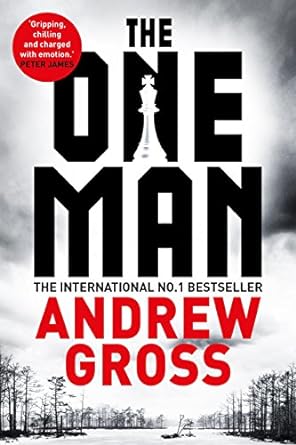The One Man
By Andrew Gross
Summary

| Content | 6/10 |
| Readability | 8/10 |
| Presentation | 8/10 |
| Ideas | 7/10 |
| Value for money | 6/10 |
| Did it do what it said on the box? | 6/10 |
How do the rankings work?
The Review
Decent Thriller but with Annoying and Unnecessary Timeline Errors
Overall this is a cracking WWII thriller, set around the concept of an Allies break in into Auschwitz to rescue a specific prisoner who holds information vital to the Manhattan Project. Andrew Gross has done a great job of capturing the horror and brutality of life in the labour camp, in the constant shadow of the mass exterminations. He weaves into this some believable characters including a Polish Jew who had successfully escaped from occupied Europe, and is then prevailed upon to return to carry out an almost impossible mission, and his nemesis in the form of a side-lined Abwehr Colonel.
Both the set up of the situation and key players in the first half of the book and the suspenseful execution in the second ploy keep hold your attention turning pages right until the conclusion. The core material seems to have been well researched and is based on some well-documented history including Neils Bohr’s daring escape from the Nazis, and Denis Avey’s extraordinary excursion from the Auschwitz POW camp into the death camp to establish a first-hand record of the horrors.
It’s therefore a great shame that this is to some extent spoiled by a number of frustrating and wholly unnecessary errors in the timeline. Other reviewers have observed how the timelines for the key characters don’t quite “add up”. Beyond that there are completely incorrect factual references. The camp commandment goes to a meeting in May or June 1944 with Heinrich Himmler, fair enough, and Reinhard Heydrich, which would be a bit more of a challenge as he was assassinated in June 1942. The central character observes preparations for D-Day, counting the Stirling bombers out and back in again, and is pleased to benefit from the “newly introduced” Mosquito for the mission. The Mosquito was introduced in late 1940, and the Stirling was almost entirely eclipsed by the Lancaster and Halifax after 1943. Why add these incorrect references, when the book would have been fine without those details altogether?
I enjoyed this story, and will probably read some more of the author’s work, but it did leave me feeling a bit annoyed, and for no good reason.
Buy It From Amazon
Amazon.co.uk  |  | Amazon.com
|

 Thoughts on the World (Main Feed)
Thoughts on the World (Main Feed) Main feed (direct XML)
Main feed (direct XML)